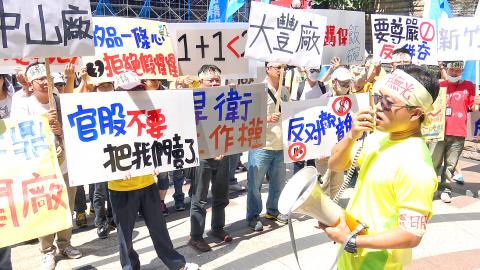Advanced Semiconductor Engineering Inc (ASE, 日月光半導體), the world’s biggest chip packager and tester, yesterday said it bought a 5 percent stake of Siliconware Precision Industries Inc (SPIL, 矽品精密) on the open market, meeting the minimum requirement in its NT$35 billion (US$1.07 billion) bid to take over the local rival.
The progress boosted ASE’s confidence of acquiring SPIL, with the company saying it will continue to make cash purchases of SPIL stock at NT$45 per share until Tuesday as planned, according to an ASE statement.
The Kaohsiung-based company aims to buy as many as 770 million SPIL shares, or a 25 percent stake, which will make ASE its second-largest stakeholder.

Photo: Liu Hsin-de, Taipei Times
“As the minimum condition has been satisfied, ASE will pay NT$45 per common share and NT$225 per ADR [American depositary receipt] payable in the equivalent amount of US dollars on or before Sept. 30,” ASE said in the statement.
As of yesterday, ASE had bought about 156.55 million common SPIL shares, including its US depositary receipts, surpassing the tender offer’s threshold of 155.82 million shares, the statement said.
In a struggle to defend its ownership, SPIL again suggested that investors not tender their shares, or withdraw tenders made to ASE on grounds that NT$45 per share is unreasonable.
The offer price represents a mere 6.76 percent premium on SPIL’s closing price of NT$42.15 on Thursday, SPIL said in a note to shareholders yesterday.
SPIL, the world’s No. 3 chip packager, reiterated that a SPIL-ASE tie-up would not create much synergy, as 85 percent of its customers overlap with ASE’s.
The acquisition will cause order losses for SPIL, as customers will allocate some orders to a third supplier rather than put all their eggs in one basket, the note said.
In a bid to block the acquisition, SPIL has agreed to form a strategic alliance with Apple Inc’s major iPhone and iPad assembler, Hon Hai Precision Industry Co Ltd (鴻海精密), via a share swap.
The proposed alliance with Hon Hai will create greater synergy in terms of customers and technology, SPIL said.
The firm’s board of directors recommended that shareholders support the strategic alliance with Hon Hai, which is to be discussed at an extraordinary shareholders’ meeting on Oct. 15.
SPIL employees also opposed ASE’s bid.
A group of SPIL employees rallied in front of the Ministry of Labor building in Taipei, saying the deal puts their jobs at risk, citing ASE’s track record of layoffs following merger-and-acquisition deals.
The employees asked the ministry not to sell its SPIL holdings.
The ministry has about a 5.8 percent stake in SPIL via three public pension funds, SPIL records showed.
The ministry said it would evaluate whether the funds would remove SPIL shares from their portfolios due to ASE’s bid, as the funds seek stable, long-term returns.
Separately, ASE urged the ministry to remain neutral over its offer.
ASE said it will not intervene in the operation of SPIL, as the takeover would be an investment.
ASE will by no means harm the interests of SPIL employees, it said.
The company added that it has expanded its local workforce from 25,274 to 35,686 over the past 10 years.

Authorities have detained three former Taiwan Semiconductor Manufacturing Co (TMSC, 台積電) employees on suspicion of compromising classified technology used in making 2-nanometer chips, the Taiwan High Prosecutors’ Office said yesterday. Prosecutors are holding a former TSMC engineer surnamed Chen (陳) and two recently sacked TSMC engineers, including one person surnamed Wu (吳) in detention with restricted communication, following an investigation launched on July 25, a statement said. The announcement came a day after Nikkei Asia reported on the technology theft in an exclusive story, saying TSMC had fired two workers for contravening data rules on advanced chipmaking technology. Two-nanometer wafers are the most

Tsunami waves were possible in three areas of Kamchatka in Russia’s Far East, the Russian Ministry for Emergency Services said yesterday after a magnitude 7.0 earthquake hit the nearby Kuril Islands. “The expected wave heights are low, but you must still move away from the shore,” the ministry said on the Telegram messaging app, after the latest seismic activity in the area. However, the Pacific Tsunami Warning System in Hawaii said there was no tsunami warning after the quake. The Russian tsunami alert was later canceled. Overnight, the Krasheninnikov volcano in Kamchatka erupted for the first time in 600 years, Russia’s RIA

CHINA’s BULLYING: The former British prime minister said that he believes ‘Taiwan can and will’ protect its freedom and democracy, as its people are lovers of liberty Former British prime minister Boris Johnson yesterday said Western nations should have the courage to stand with and deepen their economic partnerships with Taiwan in the face of China’s intensified pressure. He made the remarks at the ninth Ketagalan Forum: 2025 Indo-Pacific Security Dialogue hosted by the Ministry of Foreign Affairs and the Prospect Foundation in Taipei. Johnson, who is visiting Taiwan for the first time, said he had seen Taiwan’s coastline on a screen on his indoor bicycle, but wanted to learn more about the nation, including its artificial intelligence (AI) development, the key technology of the 21st century. Calling himself an

South Korea yesterday said that it was removing loudspeakers used to blare K-pop and news reports to North Korea, as the new administration in Seoul tries to ease tensions with its bellicose neighbor. The nations, still technically at war, had already halted propaganda broadcasts along the demilitarized zone, Seoul’s military said in June after the election of South Korean President Lee Jae-myung. It said in June that Pyongyang stopped transmitting bizarre, unsettling noises along the border that had become a major nuisance for South Korean residents, a day after South Korea’s loudspeakers fell silent. “Starting today, the military has begun removing the loudspeakers,”